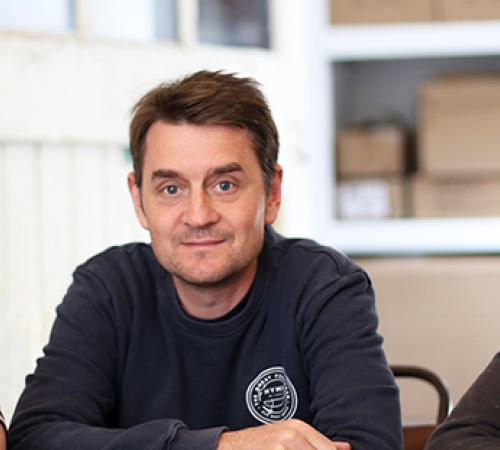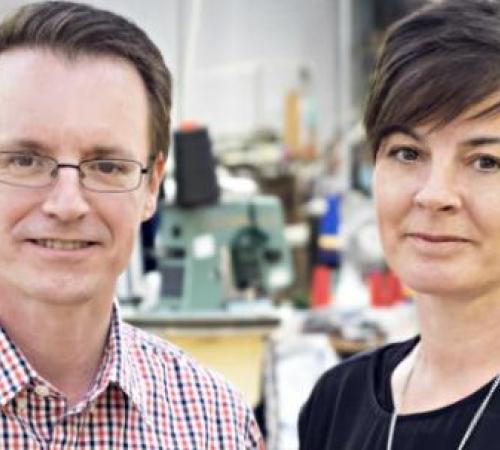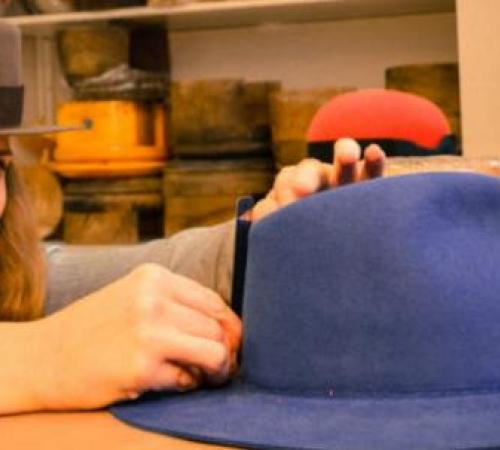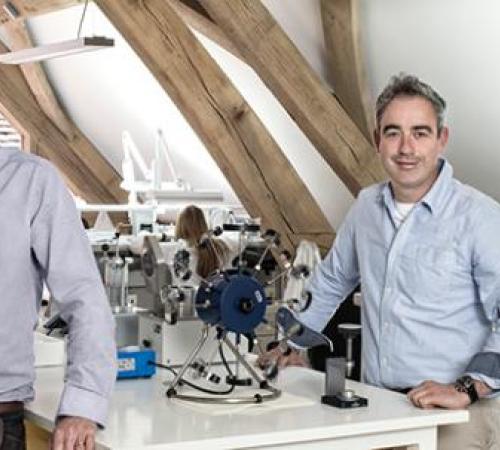
Five minutes with an entrepreneur: Richard Moross

Can you briefly explain what your firm does?
Moo is an online printer, which produces business cards for clients in about 200 countries around the world.
How many employees does it have?
We have 125 people in our offices in London and the US.
How much is its revenue this year?
For the calendar year 2011 our revenue was £12.8 million.
For how long has it been in business?
Moo.com launched in September 2006.
From where did you get the idea for the business?
The idea popped into my head one night. I couldn’t sleep so, rather than counting sheep, I tried to think of new products I might invent. I had the idea of reinventing the business card. The traditional business card was rather boring and had remained unchanged for many years. I was fascinated that everyone in their working lives uses business cards, but that there wasn’t a consumer version of it.
My original idea was about personal business cards not professional ones, but as it’s turned out we’ve become one of the world’s fastest-growing printers of professional business cards! But, in the process, we’ve changed the way in which business cards are ordered, made and designed. We’ve enabled very small businesses to go online and design their own cards rather than go to a professional designer and printer.
Is this your first start-up?
Yes, it is, although after I graduated from university I worked at someone else’s start-up for a couple of years.
Why did you want to start up your own firm?
Why wouldn’t you want to start up your own business? If you can, you should. You have the control and the freedom, the rewards and enjoyment of creating and developing a company.
Where did you get the initial cash to start your business?
I got £150,000 from an angel investor called Robin Klein, who was a friend of one of my Dad’s friends. I was very young at the time – only 25 – so I had no network of contacts myself and had no experience of raising money.
How has your business plan changed since you first wrote it?
It has changed a lot. Before setting up Moo I spent about 18 months running a failed early version of it. It had a terrible name – Pleasure Cards – and was a very different concept: it was essentially a social network with a card-printing business on the side. But people didn’t really like it, so we changed it.
We rebranded it to become Moo, and raised more money and that was where the new business began. We chose to work with other social networks and online communities, putting their content on our cards. The cards were essentially the same but the brand, the business model and the team were all very, very different.
The plan has changed since then, but I think one of the challenges of being an entrepreneur is adapting to the different stages of your business.
What’s been your biggest mistake since starting up?
I’ve made plenty, but it’s difficult to view them as mistakes when they contributed to the success of today’s business in some shape or form.
But if there was one thing I really regret it was calling my first business Pleasure Cards. It was an awful name and I remain hugely embarrassed by it!But as Moo wouldn’t have existed without Pleasure Cards I can’t have too many negative feelings about it.
I’m not that bothered by the idea of failure per se. I’m a planner at heart, so for me it’s not about what’s happening today, it’s about what might happen tomorrow. If what’s happening now isn’t what I’d have wanted it to be, that doesn’t really matter because I’m always looking forward to what’s around the corner. You have to keep moving forwards.
What’s been your biggest achievement since starting up?
Hiring some really fantastic people. One of the great things about having a growing business is that you can attract some really smart people to work with you. At Moo, we have lots of interesting people who’ve done many different things before they joined us. So I’ve been able to learn a lot from working with them. It’s something I’m very proud of.
Has it been hard to make the transition from being start-up entrepreneur to CEO?
I’ve always been interested in growing with the business. That can be challenging, because you’re doing things you’ve never done before. But I always had an interest in being a businessperson, so this felt like the perfect opportunity for me to do that. I’ve had to adapt and learn, but I take it very seriously.
I go on training courses, I have a mentor and am involved in business networks outside of work. You shouldn’t take it for granted that just because you started the business that therefore you should run it. But I’m not perfect – I’m learning on the job. However, I have a great team of advisers, as well as a good board of directors and chairman so I get plenty of good guidance.
Did you ever think your firm would grow as quickly as it has in the past three years?
Yes, you need to be optimistic otherwise you wouldn’t do it. Although I thought there was just as much chance that it wouldn’t take off. But it has outstripped all our initial expectations and, in the long term, it will likely exceed all of the wildest claims we made in our initial business plan.
What has been comforting is that all the assertions we made in our original plan, about product quality, margin, speed of delivery and how customers would react, have been proven to be true. How quickly you can grow your revenues and customers are very variable and are based on factors you can’t see clearly when you start out.
Do you expect it to continue to grow as rapidly in the future?
Yes, if not faster.
Has that rapid growth created any challenges for you?
The hardest aspect of growing a business is always hiring the right people. We have a very strong culture, which we believe is very important because it contributes to our success.
So we spend a lot of time over hiring people, trying to find the right people for our business. We’ve hired 50 people this year and finding the right people for this stage of the business to keep up with our rate of revenue growth has been very challenging.
Entrepreneurship – is it nature or nurture?
It’s a combination. For me, it was my ability and desire to go to work for other people – I thought I could do better on my own. Obviously macro-economic trends are contributing factors – there are lots more entrepreneurs in a recession. But also many entrepreneurs seem to display similar character traits.
For example, a disproportionate number of successful entrepreneurs suffer from dyslexia, probably because the difficulties they encountered in their schooling and in learning skills for traditional jobs meant they were more comfortable following their own path.
I don’t come from a family of entrepreneurs, but I remember a dinner given by some of my parents’ friends. One of the guests would get up every five minutes to take or make a call. His name was Richard Joseph and he ran Books Etc. at the time. He was the first entrepreneur I’d met, but I thought then, aged about 10, what an exciting life he must lead. So, from an early age, I thought running a business was a very attractive job.
If you were made Prime Minister for the day what specific changes would you make to help small businesses?
The government seems to be moving in the right direction, in my opinion. Having access to the right kind of capital at the right time is very important for small businesses. That doesn’t have to come from banks, and the government has made some interesting proposals on this issue, such as encouraging angel investors to put money into small start-ups by offering them generous tax breaks through the Seed and Enterprise Investment Schemes.
Also, I’m pleased about the changes to the tax treatment in EMI options schemes, allowing the same tax relief to be applied for all employees in the company, not just the founder. The first 10, 20 or 30 employees also take a lot of risk by joining a start-up.
Whereas only the founder used to enjoy taper relief at 10%, while others would pay the usual 28% CGT, these changes will allow anyone enrolled in an EMI options scheme to enjoy this greatly reduced tax burden in reward for the risk they have taken in joining an early stage company. It’s a fantastic initiative.
These changes will encourage people to take more risk.
What plans do you have for your business?
We’re going to put all our efforts into sustaining our rate of growth, and, even increasing it. We’ll do that by continued geographic expansion, innovation and diversification of our product line. We’ve recently made an acquisition of an online website-profile builder, which we’re very excited about. The future of the business card may be a digital identity that you can share on the web or from your phone.
Who are your heroes (either inside or outside business)?
I have a shelf full of books written by people whom I admire. But the book that I enjoyed and which excited me the most was James Dyson’s autobiography. His story is so inspiring: he’s an inventor and designer as well as an entrepreneur and the determination and persistence required to get him where he is today are amazing. And he’s still innovating: he continues to come up with new products. His brand and his business are amazing.
What tips or advice would you give to budding entrepreneurs?
That’s such a hard question, because everyone is different. But the trait that every successful entrepreneur has is determination. If starting your own business were easy then everyone would do it. It is very important to stick with it. Dyson is a great example: it took him years of hard work and investment, but he’s now built up one of the best companies in the UK.
Disclaimer:
At Hiscox, we want to help your small business thrive. Our blog has many articles you may find relevant and useful as your business grows. But these articles aren’t professional advice. So, to find out more on a subject we cover here, please seek professional assistance.






